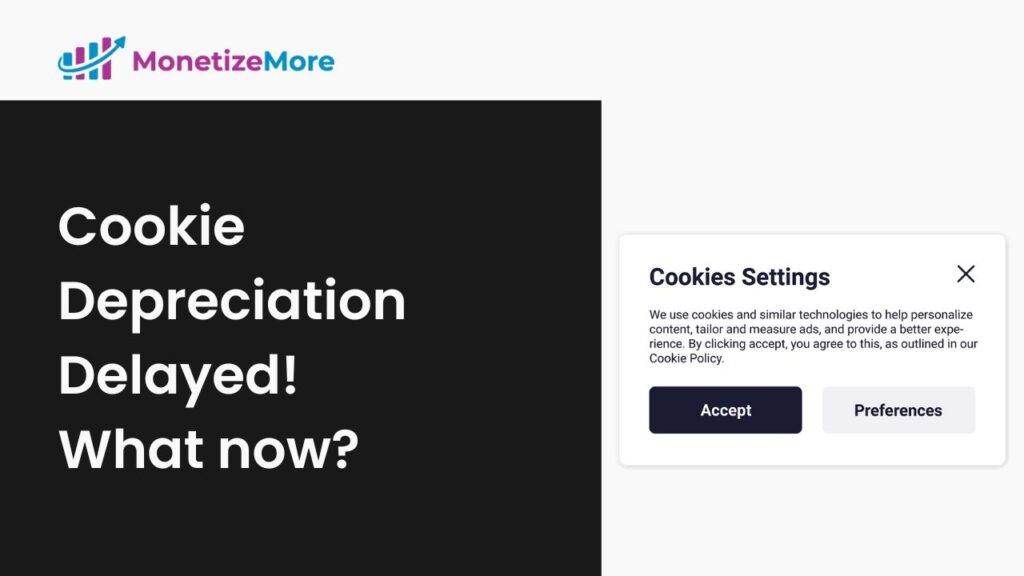The postponement of Google’s third-party cookie deprecation isn’t your salvation—it’s a distraction from what truly matters in programmatic advertising: provable sales impact. While many publishers exhale with relief, forward-thinking revenue leaders recognize this delay postpones the inevitable while missing a crucial opportunity to transform ad operations.
The Revolving Door of Cookie Deprecation
Google has once again postponed the demise of third-party cookies, creating an illusion of stability in digital advertising. For publishers and app developers, this feels like déjà vu, another announcement that reshuffles industry roadmaps while solving none of the fundamental problems.
This postponement doesn’t signal a return to business as usual. Instead, it highlights the precarious foundation supporting much of today’s programmatic advertising ecosystem. The underlying issues remain unchanged:
- Privacy regulations continue expanding globally
- Consumer trust in tracking technologies keeps eroding
- Alternative browsers maintain their cookie-blocking policies
- Advertisers increasingly demand proof of performance beyond impressions.
The False Security of Attribution Modeling
In boardrooms across the digital advertising landscape, CFOs and marketing executives are asking tougher questions about ad performance:
“How do we know these impressions actually drove sales?” “What’s the verifiable ROI on our programmatic spend?” “Can you prove these ads influenced purchasing decisions?”
Traditional attribution models struggle to provide satisfactory answers. Post-view conversion claims, multi-touch attribution, and probabilistic modeling all share a critical flaw: they’re educated guesses rather than verified facts.
This creates an increasingly unstable revenue foundation for publishers. When advertisers can’t confidently connect their spending to business outcomes, budgets become vulnerable during economic uncertainty.
Cross-Browser Reality and Fragmented Measurement
While Google Chrome temporarily maintains cookie support, Safari and Firefox representing over 35% of browser market share continue blocking third-party cookies by default. This browser fragmentation creates measurement blind spots that undermine campaign performance assessment.
Publishers optimizing solely for Chrome-based measurement effectively ignore a substantial portion of their audience. As privacy-focused browsers gain market share, this problem will only intensify.
It’s time to recognize that cross-browser measurement isn’t optional, it’s essential for accurate reporting and sustainable advertiser relationships.
The Regulatory Landscape Continues Shifting
Despite Google’s timeline adjustment, privacy regulations show no signs of relaxing:
- EU regulators continue scrutinizing tracking technologies under GDPR
- California’s CCPA/CPRA enforcement keeps expanding
- New privacy laws emerge across states and countries monthly
- Class-action lawsuits targeting tracking practices multiply.
Regulatory compliance isn’t a one-time project for publishers but an ongoing operational requirement. Cookie availability doesn’t eliminate these compliance burdens.
Deterministic Attribution: The Publisher’s Revenue Accelerator
While the industry debates cookie timelines, you need to implement deterministic attribution systems that eliminate uncertainty.
Digital couponing exemplifies this approach by creating a verifiable connection between advertising exposure and in-store purchases:
- User views an ad on the publisher platform
- User engages with a digital coupon offer
- User redeems coupon at physical store
- Purchase data confirms conversion.
This closed-loop model provides certainty, which probabilistic attribution cannot. No statistical modeling is required to connect the advertisement to the eventual purchase, the path is direct and verifiable.
The Business Case for Outcome Verification
For publishers, implementing deterministic attribution systems delivers multiple benefits:
1. Premium Pricing Opportunities
When you can guarantee advertisers verifiable outcomes rather than probabilistic models, you justify premium inventory pricing. Certainty commands a premium in uncertain markets.
2. Budget Protection During Economic Contraction
Advertising budgets typically contract during economic uncertainty, but channels demonstrating clear ROI retain funding. Deterministic attribution protects publisher revenue by definitively proving value.
3. Advertiser Retention Improvement
Advertisers stay committed to platforms where they can verify performance. By implementing closed-loop attribution, publishers reduce churn and extend client relationships.
4. Regulatory Risk Reduction
Deterministic attribution often relies less on persistent tracking identifiers, reducing exposure to evolving privacy regulations and potential fines.
Implementing Outcome-Based Advertising Models
If you’re seeking to maximize revenue through deterministic attribution, you should:
- Evaluate digital coupon integration opportunities that connect online ads to in-store purchases
- Partner with retail data providers offering verified purchase information
- Develop first-party authentication strategies enabling consensual user identification
- Create advertiser education programs highlighting the limitations of probabilistic attribution.
The Time for Transformation Is Now
Google’s cookie postponement creates a critical opportunity for publishers to implement deterministic attribution while others remain complacent, this timing advantage enables us to:
- Perfect implementation while competitors delay
- Establish leadership positions in verified outcome delivery
- Secure premium pricing before market commoditization
- Build differentiated advertiser relationships based on proven performance.
Beyond Cookie Dependency
The most successful publishers in the coming years won’t be those clinging to third-party cookies or waiting for Google’s next announcement. They’ll be those who recognize that advertisers increasingly demand verifiable outcomes rather than probabilistic promises.
By implementing deterministic attribution now, you can establish sustainable competitive advantages that persist regardless of cookie availability. When advertisers can definitively connect their spending to business results, they commit more budget with greater confidence, creating the foundation for ad revenue growth even in challenging economic environments.
The cookie clock may have reset, but the direction remains clear: the future belongs to those who can prove their value, not those who merely claim it!
Looking to scale your revenue despite all the cookie chaos? Get started here!
With over ten years at the forefront of programmatic advertising, Aleesha Jacob is a renowned Ad-Tech expert, blending innovative strategies with cutting-edge technology. Her insights have reshaped programmatic advertising, leading to groundbreaking campaigns and 10X ROI increases for publishers and global brands. She believes in setting new standards in dynamic ad targeting and optimization.
